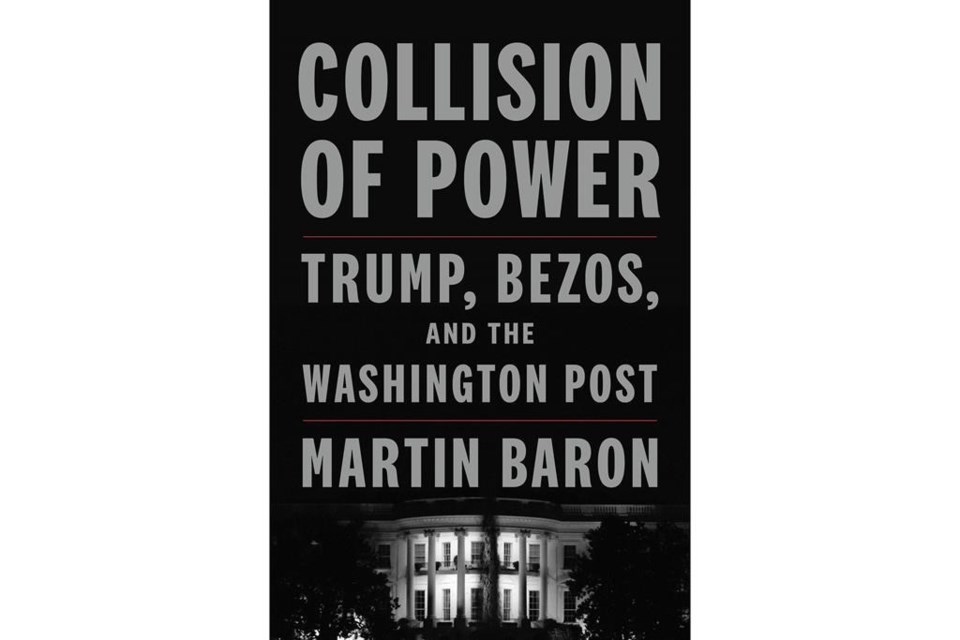ŌĆ£Collision of Power: Trump, Bezos and The Washington PostŌĆØ is actually a trilogy ŌĆō an insiderŌĆÖs revealing examination of stewardship of The Washington Post, a chronicle of how Donald Trump tried mightily to discredit the Post and sink Amazon, and a tense, sometimes thriller tale of how the Post navigated a perilous time in journalism.
In all the tumult, Bezos emerges as determined, disciplined, analytical, focused, strategic in his thinking and remarkably calm as a perpetually angry Trump relentlessly used his presidential pulpit to attack Amazon. Bezos founded Amazon but it is unconnected to the Post, which Bezos bought with his own funds and in BaronŌĆÖs telling, seems to genuinely relish owning.
Baron, executive editor of the Post from 2013-2021, clearly has researched extensively and thought deeply about how to cover the unprecedented presidency of Donald Trump. Baron writes that he ŌĆ£needed to get myself ready for his brand of presidencyŌĆØ and cites the books he read on authoritarianism and the manipulation of public opinion.
Among the books he read: ŌĆ£How Democracies Die,ŌĆØ published by two Harvard professors in 2018.
For a time, Trump took to calling Baron at all hours, complaining in one call that a Post piece depicted him as ŌĆ£slobŌĆØ and ŌĆ£little boy.ŌĆØ Baron said the president then informed him that he ŌĆ£was not a little boy.ŌĆØ
In a case that contained scenes reminiscent of a movie thriller, Post reporters followed a woman they had come to suspect was trying to entrap the Post in a sting operation designed to discredit a Post investigation into Alabama Republican Senate candidate Roy Moore.
Ultimately, Baron writes, it was ŌĆ£infamous for setting up stings to expose what it considers the liberal bias of mainstream mediaŌĆØ that Post reporters exposed as the organization behind the effort to discredit the paper.
To any who think the news media march to the same cadences, Baron writes ŌĆ£newsrooms often are a wellsprings of conflict, dissent and grievance.ŌĆØ
Often, though, from spirited arguments, great journalism arises. And columnists sometimes can put an issue in play that reporters cannot.
Baron and colleagues judged that the Post lacked enough evidence of impropriety while examining telephone conversations between incoming national security advisor Michael Flynn and RussiaŌĆÖs ambassador to the United States.
However, as Baron writes, ŌĆ£opinion columnists.... have far more leeway than news reporters.ŌĆØ
Respected Post foreign affairs specialist David Ignatius raised questions about the conversations that reporters in the news pages could not and when the Ignatius column published, Baron writes, it prompted more sources to come forward. That helped give the Post news team the sourcing it needed.
ŌĆ£CollisionŌĆØ serves as a reminder throughout of how fragile democracy is, and how the social media era has made it easier to commandeer public opinion.
Baron writes that the which typically monitors threats to press freedom in other countries, began to focus on Trump as a threat within U.S. borders. During the first two years of his administration, CPJ found, 11% of TrumpŌĆÖs tweets denigrated the press.
Perhaps the answer is as Baron quotes Bezos as saying: ŌĆ£We need unifiers, not vilifiers.ŌĆØ
Jeff Rowe, The Associated Press



